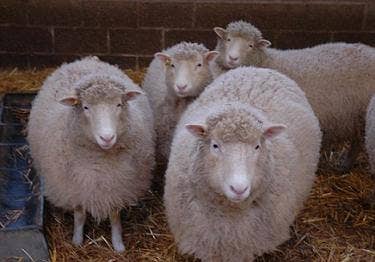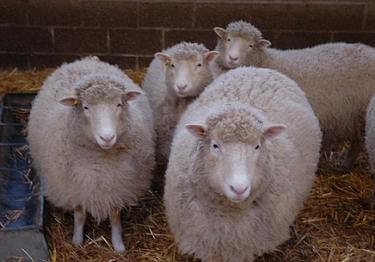Dolly Lives! The Original Cloned Sheep has Four New Copies

Share
Surprise! The world's most famous cloned sheep, Dolly, has four living copies enjoying the sweet life in England. Dolly was the world's first cloned mammal, and a huge media sensation when she appeared. Professor Keith Campbell, one of the original scientists who cloned the ewe back in 1996, recently announced that he and colleagues had created four more clones...three and half years ago! The new 'Dollies', if you will, reside as pets on land run by the University of Nottingham and show none of the health problems that plagued their genetic twin. The original Dolly was euthanized in 2003 after contracting a lung infection and possibly suffering from arthritis. Sheep can live as long as 11-12 years (roughly twice as long as Dolly) so the general public seemed to take Dolly's death as proof that cloning led to advanced aging. There are still many who fear that clones of mammals will age unnaturally fast. The new Dollies, if they continue to live healthy lives, could serve as a valuable PR to get us believing in the power of clones again. Just in time too, because Campbell says that our cloning techniques are getting better.
"Many, many clones [since Dolly] have lived normal lives and lived to good ages of 10 or 11 years old or more," --- Keith Campbell to BBC News, 2010
I'm starting off with this quote to give you an idea about the disparity between public opinion, and Campbell's insights into cloning. The Dollies, including the original, are far from the only cloned sheep in the world. Campbell and coworkers have produced about a dozen others, many that have lived beyond the decade mark. Yet their presence has largely been ignored. Campbell recently spoke at the European Parliament to update EU decision makers on the facts behind cloning as he saw them. To grossly oversimplify what he said: cloning is getting easier, clones are healthier than you think, and people are going to start using this technology all over the world.
To address the first part Campbell compared the creation of the new Dollies to the original. In 1996, 277 eggs were used to create 29 embryos, only one of which became the viable and living clone known as Dolly. Back in 2007, it took about 5 embryos to create each of the four new Dollies. Fewer genetic material was required, scientists had to spend less labor, and there was generally less failure. In other words, a decade's progress meant that we could now create (at least) four clones more easily than we created one. In the last three years we've probably improved even further. Whether you want to think of that as exponential or linear improvement, there's little doubt that we're getting better at making some types of mammal clones .
But are they getting better at living? Around the time of Dolly's death in 2003, you heard a lot of talk about her telomeres - the little repetitive bits of DNA that hang out on the end of your chromosomes and grow shorter as you age. Dolly had shorter telomeres, and she died before her time - what more proof do you need that cloning causes advanced ageing? ...Well, lots. The National Museum of Scotland, and Campbell, point out that Dolly died of a lung infection common among sheep stored in close quarters. She didn't have a magical clock in her genetics go off that caused her to shrivel and die. Yes, telomeres are important, and there are still many unanswered questions about the effect of cloning techniques on animals. We need many more cloned sheep, and cloned mammals in general, to live out their lives before we'll know for certain what artificial asexual reproduction really does. In the meantime, linking cloning to advanced ageing is premature and probably wrong.
Be Part of the Future
Sign up to receive top stories about groundbreaking technologies and visionary thinkers from SingularityHub.


Tell that to the Internet. I think that Campbell's recent announcement of Dolly's sister clones is a tactical maneuver aimed at controlling some of the rampant misconceptions of the public about cloning. Showing that some random cloned sheep live for a decade is nice, but it's not going to assuage fears that clones will go from cherub to Emperor Palpatine in a few months. No, what we really need is a cloned sheep named 'Dolly' to make it to 12 years old in order to dispel the clone-advanced ageing link. Campbell hedged his bets and made four. Give them time, and I think these ewes could help the world re-examine the viability of cloning.
Once it does, the global market may be filled with cloned meat. We've already shown how cattle are selected to an absurd degree (now using genetic tests) to breed animals for the best traits. Think about what cloning could add to this field. Instead of making do with a single prize bull (or ram) for breeding, you could make dozens of copies of him. Each could provide the semen to impregnate thousands of heifers (or ewes). To the owners of these bulls that could mean millions of more dollars in their pockets. To the public it will mean that the global meat market will creep nearer and nearer to a monoculture.
As with all ethically dubious cutting-edge biological technologies with mixed public opinions, we're likely to see China take the lead with cloning if the US and EU hold back. That being said, I'm not sure how much the West is going to restrain itself. The FDA's risk assessment for cloned animal products reads something like a free pass for the technology. The European Food Safety Authority is more cautious in their assessment. (One media source implies Campbell went to the European Parliament in large part to refute EFSA concerns.) Still the EFSA admits that meat from the offspring of cloned animals is pretty much identical to other meat, and only recommends caution in moving forward, not outright avoidance of the technology. We may have clone-enabled foods on our tables sooner than you think.
Which is a good reason to start paying more attention to the science of cloning. People really seem to have ignored this technology. Quick survey, how many times a day do you think, "hey, I live in a world with clones in it"? I'm guessing way less than one. Yet the arrival of clones could be just as important as social networking or flashing iPhone touchscreens, or whatever else is consuming your thought processes each day. Scientists have created hundreds of cloned animals, covering many different species, including a few that are endangered. Campbell's work with sheep shows that we're getting closer to the "one embryo one clone" success rate we're likely to want before we start cloning humans. Any way you figure it, cloning deserves a lot more attention than it gets on a regular basis. The new Dollies may be just more of the same, but if they get us thinking about cloning again they'll be well worth it.
[image credit: DailyMail.co.uk]
[sources: DailyMail, BBC News, NMS]
Related Articles

More Space Junk Is Plummeting to Earth. Earthquake Sensors Can Track It by the Sonic Booms.

Researchers Break Open AI’s Black Box—and Use What They Find Inside to Control It

This Week’s Awesome Tech Stories From Around the Web (Through February 21)
What we’re reading
